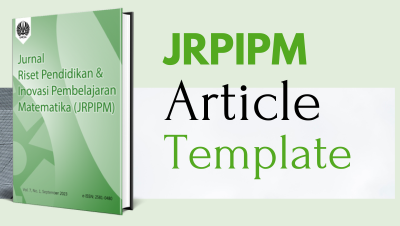Students Combinatorial Thinking Processes in Solving Mathematics Problem
DOI:
https://doi.org/10.26740/jrpipm.v2n2.p80-92Keywords:
Combinatory, Combinatorial thinking, combinatory problemsAbstract
Combinatorial thinking is a way of thinking in solving combinatory problems. Combinatory problems are one of the difficult problems for students to solve. This study aims to analyses students combinatorial thinking processes in solving problems. Given two combinatory problems that consist of problems with multiplication rule and combination. The Problems were given to two 11th grade senior-high school students. The results obtained were that there was a tendency for male Participants to do the two different ways which are direct counting and using diagram. The female participants did the work with one way which is direct counting. On more complex issues, namely about combination, students' thinking models go through stages of set of outcomes. From this research, it is expected that combinatory material learning is emphasized on the discovery of formulas by students themselves inductively, especially deductively. So that in this case the students interpret the combinatory formula more.References
[1] Lockwood, E., & Reed, Z. (2018). Leveraging Specific Context and Outcomes to Generalize in Combinatorial Setting. INDRUM 2018, INDRUM Network, University of Agder, Kristiansand, Norway.
[2] Lockwood, E. (2013). A model of students combinatorial thinking. Journal of Mathematical Behavior, 32, 251-265.
[3] Lockwood, E. & Reed. Z. (2018). Reinforcing Mathematical Concepts and Developing Mathematical Practices Through Combinatorial Activity. Teaching and Learning Discrete Mathematics Worldwide: Curriculum and Research, 93-101.
[4] Ammamiarihta, Syahputra, E., & Surya, E. (2017). Development of Learning Devices Oriented Problem Based Learning to Increase Students Combinatorial Thinking in Mathematical Problem Solving Ability. Advances in Social Science, Education and Humanities Research, 104, 334-339
[5] Rezaie, M., & Gooya, Z. (2011). What do I mean by combinatorial thinking? Procedia Social and Behavioral Sciences, 11, 122-126.
[6] Budayasa, I. K. (2008). Matematika Diskrit. Surabaya: Unesa University Prss.
[7] Rosen, K. H. (2011). Elementay Number Theory and Its Applications (6th ed.).Boston: Pearson.
[8] English, L. D. (2005). Combinatorics and the development of childrens combinatorial reasoning. Exploring probability in school: Challenges for teaching and learning, 40, 121-141.
[9] Melusova, J., & Vidermanova, K. (2015). Upper-secondary Students Strategies for Solving Combinatorial Problems. Procedia - Social and Behavioral Sciences, 197, 1703-1709.
[10] Lockwood, E. (2011). Student connections among counting problems: An exploration using actor-oriented transfer. Educational Studies in Mathematics, 78(3), 307-322. doi:10.1007/s10649-011-9320-7
[11] Lockwood, E., Swinyard, Craig A., Caughman, John S. (2015). Patterns, Sets of Outcomes, and Combinatorial Justification: Two Students Reinvention of Counting Formulas. International Journal of Research in Undergraduate Mathematics Education, 1(1), 27 62.
[12] Lockwood, E., Reed, Z., & Caughman, J. S. (2017). An Analysis of Statements of the Multiplication Principle in Combinatorics, Discrete, and Finite Mathematics Textbooks. International Journal of Research in Undergraduate Mathematics Education, 3(3), 381416.
[13] Syukriani, A., Juniati, D., & Siswono, T. Y. (2017). Investigating Adaptive Reasoning and Strategic Competence: Difference Male and Female. AIP Conference Proceedings. Retrieved from https://doi.org/10.1063/1.4994436
[14] Lockwood, E., & Gibson, B. R. (2015). Combinatorial tasks and outcome listing: Examining productive listing among undergraduate students. Educ Stud Math, 91, 247-270. doi:10.1007/s10649-015-9664-5
[15] Aini, N., Juniati, D., & Siswono, T. Y. E. (2018) Understanding The Combinatorial Thinking Through The Strategy Used by Students Cognitive Reflective in Solving Permutation. International Conference on Mathematics and Science Education, 3, 652-657.
Downloads
Published
How to Cite
Issue
Section
 Abstract views: 894
,
Abstract views: 894
, PDF Downloads: 730
PDF Downloads: 730






